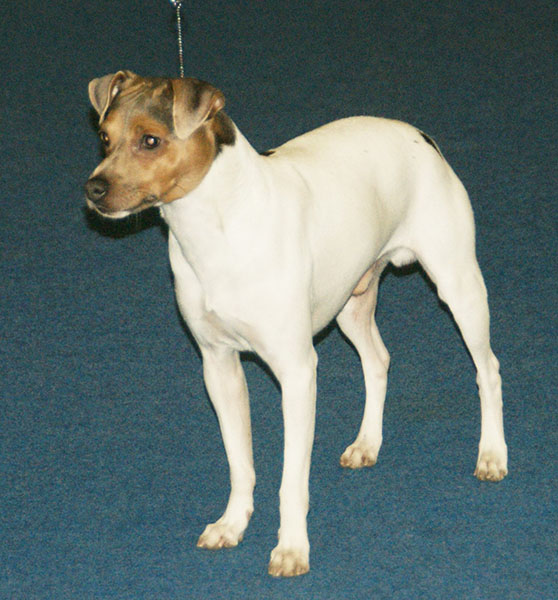The Brazilian Terrier is one of two recognized dog breeds from Brazil. Most likely derived from Parson Russell Terriers and Smooth Fox Terriers (although their family tree is ultimately a mystery), they were employed to rid farmer’s crop fields of vermin. They are attentive to their surroundings, very lively and quite fearless like most terrier breeds. They make good watchdogs although can be overly vocal when something has really caught their attention. These terriers have stronger-than-average prey drives and cannot normally be trusted around small pocket pets or cats. Brazilians usually get along with other dogs as long as they were socialized to them when young.
Brazilians are intelligent and obedient. They enjoy playtime and can be easily be trained if the sessions are made into fun games! They do require regular training throughout their lives to keep them mentally engaged and out of trouble, as their mind must have a job to do. Some good choices of dog sports that double as jobs include barnhunt rally, ability, obedience, trick training and tracking. These terriers can be independent and do have a stubborn streak so be prepared to be firm while remaining fair! When it comes to training, they learn best with experienced owners and trainers because of their overly willful natures.
Brazilian Terriers are friendly and enjoy the attention of their owners, which they may at times demand! This said, they are loyal and gentle making them great family pets. They can do well around kids, although are recommended for those who have already grown out of the toddler stage as they don’t tolerate rude behavior. Their small size, decent lifespans (averaging 12-14 years) and amusing temperaments make them an attractive choice for active individuals or families. While they are wary of strangers, they will eventually warm up once they get to know the person.
The Brazilian has a bad habit of digging holes in the yard because of his terrier nature. Giving him his own digging space, like a sandbox, would not be a bad idea lest he go after your flower garden! As he is an active breed, he also benefits from regular exercise to keep him out of trouble (an hour a day, bare minimum). He’s a bit too energetic to do well in an apartment and needs both long daily walks combined with time in a fenced-in yard in which to putter around.
Some Brazilian Terriers are known to develop separation anxiety if they are left alone all day on a regular basis so they don’t do well for those who work full time. They also aren’t the best match for someone looking for a dog that can be walked off-leash reliably without extensive training. As mentioned above, they need an extensive amount of mental and physical exercise or they can become very destructive in short order. While they have many good qualities they will only thrive in homes which can meet their particular needs.
The smooth coat of the Brazilian is easy to care for and requires little work, usually just a quick brush once a week or when shedding. Combine this with regular dental care, nail trimmings and ear cleanings and that’s the majority of the work! These little terriers are always tricolored although can appear as a black tri, blue tri, brown tri or isabella tri with specific markings of the face needing to be present. Other key features of the breed include the triangular-shaped folded ears and athletic, long-legged build.
The Brazilian Terrier is a rare breed that is recognized in Brazil and by the FCI. He is not yet recognized in the United States by any of the large dog registries and is practically unheard of in this country. Because he was developed in the warm climate of Brazil he does tend to do better in warmer temperatures although can easily get by when it’s cold by wearing a dog coat or sweater.

Photo by Canarian
